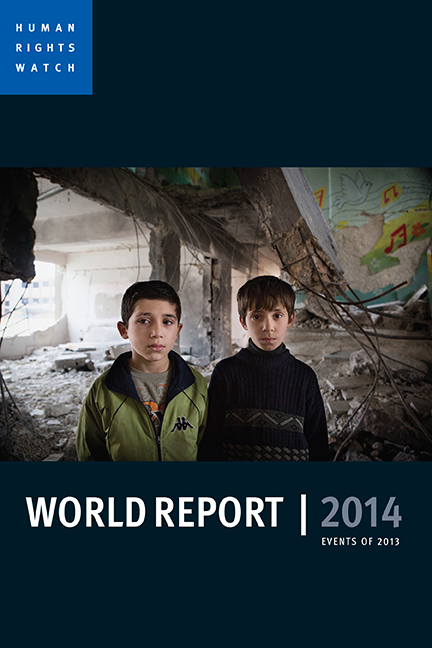Book contents
- Frontmatter
- Dedication
- HUMAN RIGHTS WATCH
- Table of Contents
- Foreword
- Rights Struggles of 2013: Stopping Mass Atrocities, Majority Bullying, and Abusive Counterterrorism
- The Human Rights Case for Drug Reform How Drug Criminalization Destroys Lives, Feeds Abuses, and Subverts the Rule of Law
- Putting Development to Rights: Integrating Rights into a Post-2015 Agenda
- The Right Whose Time Has Come (Again) Privacy in the Age of Surveillance
- Photo Essays
- AFRICA
- AMERICAS
- ASIA
- EUROPE AND CENTRAL ASIA
- MIDDLE EAST AND NORTH AFRICA
- UNITED STATES AND CANADA
- 2013 HUMAN RIGHTS WATCH PUBLICATIONS
- Acknowledgments
- Frontmatter
- Dedication
- HUMAN RIGHTS WATCH
- Table of Contents
- Foreword
- Rights Struggles of 2013: Stopping Mass Atrocities, Majority Bullying, and Abusive Counterterrorism
- The Human Rights Case for Drug Reform How Drug Criminalization Destroys Lives, Feeds Abuses, and Subverts the Rule of Law
- Putting Development to Rights: Integrating Rights into a Post-2015 Agenda
- The Right Whose Time Has Come (Again) Privacy in the Age of Surveillance
- Photo Essays
- AFRICA
- AMERICAS
- ASIA
- EUROPE AND CENTRAL ASIA
- MIDDLE EAST AND NORTH AFRICA
- UNITED STATES AND CANADA
- 2013 HUMAN RIGHTS WATCH PUBLICATIONS
- Acknowledgments
Summary
The Burundian government committed to strengthening human rights protections and made progress in certain areas, such as initiatives to address genderbased violence. A five-day national debate on the justice sector produced a set of recommendations on judicial reforms. However, the justice system remained weak and under-resourced and suffered from political interference and allegations of corruption.
Impunity for human rights abuses, particularly by state agents and youth of the ruling party, was a dominant concern. Most cases of extrajudicial killings and other acts of political violence between 2010 and 2012 remained unresolved. Prosecutions were initiated against a small number of alleged perpetrators, but proceedings were slow or seriously flawed, and several police officers accused of involvement in killings and ill-treatment were released.
Most leading opposition figures who had fled the country after boycotting the 2010 elections returned to Burundi, encouraged by the government, in advance of the 2015 general elections. However, opposition party members continued to face obstruction and harassment.
Journalists and civil society activists also encountered intimidation by the government, which accused them of siding with the opposition. In June, President Pierre Nkurunziza promulgated a new press law severely curtailing media freedoms.
Impunity for Political Killings and Other Abuses
Few of the perpetrators of the scores of political killings in 2010-2012 were brought to justice, due to a lack of political will and weak judicial system. In many cases, victims’ families were too afraid to seek redress.
In a small number of cases, judicial authorities arrested, charged, and prosecuted police officers, following investigations by a commission of inquiry into extrajudicial killings and torture set up in 2012 by the prosecutor general. The High Court in Gitega tried Michel Nurweze, known as Rwembe (“razor blade” in Kirundi), a deputy police commissioner in Gitega province, for his alleged involvement in the November 2011 murder of Leandre Bukuru, a member of the Movement for Solidarity and Democracy (MSD) opposition party. Nurweze was also tried for attempted murder and torture in two other cases. His trial could have set an important precedent in ending impunity, but at least two prosecution witnesses would not testify in court because of the absence of adequate protection.
- Type
- Chapter
- Information
- World Report 2014Events of 2013, pp. 84 - 89Publisher: Bristol University PressPrint publication year: 2014



